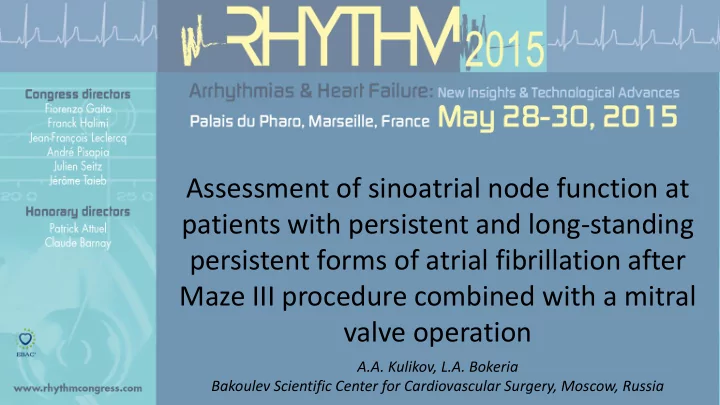

Assessment of sinoatrial node function at patients with persistent and long-standing persistent forms of atrial fibrillation after Maze III procedure combined with a mitral valve operation A.A. Kulikov, L.A. Bokeria Bakoulev Scientific Center for Cardiovascular Surgery, Moscow, Russia
Atrial fibrillation (AF) is the most common sustained cardiac arrhythmia, occurring in 1 – 2% of the general population* *ESC GUIDELINES: Death rates are doubled by AF, independently of other known predictors of mortality
In our days, as a cardiac surgery treatment intended to eliminate AF, Cox maze III procedure considered to be the "gold standard" for effective surgical cure of AF The idea is to eliminate AF by creating incisional scars to block atrial re-entry circulations.
Thus, according to Cox J.L. etc. the need of postoperative pacemaker implantations reaches up to 40% (34% of patients suffered from SSS before operation and 6% due to iatrogenesis).* According to data of Japanese researchers, the quantity of postoperative SSS reaches 12% . ** * Cox JL, Boineau JP et al. Successful surgical treatment of atrial fibrillation. Review and clinical update. JAMA 1991; 266:1976 – 1980. ** Akinori Sairaku, MD, Yukiko Nakano, MD et al. Prediction of sinus node dysfunction in patients with long-standing persistent atrial fibrillation using the atrial fibrillatory cycle length. Journal of Electrocardiology 45 (2012) 141 – 147
Considering lack of generality and some discrepancy of available data, and also absence of national recommendations concerning the matter, it seemed interesting to estimate percent of sinus node dysfunction before and after Maze III procedure at patients with persistent and long-standing persistent forms of AF.
Methods: 100 patients Electric cardioversion Electrophysiological examination Maze III procedure combined with a mitral valve operation Assessment of heart rhythm
Patients characteristics Data Value Number of patients (n) 100 Sex (n, male) 48 59,3 ± 10,2 Age (years) 4 ± 4,2 Duration of AF (years) 3 ± 0,45 Antiarrhythmic drugs (quantity of drugs/patient) Electric cardioversion (n) 15 21,8 ± 12.8 Duration of valvular disease (years) Acquired mitral valvular disease (n) 90 5,1 ± 1,5 Left atrium (sm) 58,6 ± 4,7 Cardio-thoracic ratio (%)
Electrophysiological study results At the time of research at all patients sinus rhythm with a frequency from 45 to 94 bpm was registered. At 11% of patients pathological lengthening of corrected time of sinoatrial node function recovery (CTSNFR) – 900,3 ± 300,6 ms was revealed. CTSNFR 1600 1400 1200 CTSNFR (ms) 1000 800 600 400 100 200 n Distribution of values of CTSNFR at the studied patients. The normal value is supposed less than 525 ms.
Electrophysiological study results And at 13% - pathological lengthening of sinoatrial conduction time (SACT) – 340,2 ± 80 ms was revealed. . SACT 450 400 350 SACT (ms) 300 250 200 150 100 50 100 n Distribution of values of SACT at the studied patients. The normal value is supposed less than 215 ms.
Electrophysiological study results At 11% of patients pathological lengthening of SACT was followed by pathological lengthening of CTSNFR, but at 2% the only sign of sinus node dysfunction was lengthening of SACT. Thus, 13% of patients with FP and SSS were initially revealed. 13 87 Normal SSS
Surgical treatment results At 62% of patients in the first days after surgery nodal rhythm was observed, and only at 34% of patients the sinus rhythm was restored right after operation. Restoration of normal function of sinus node happened within the first week after operation when temporarily external electrocardiostimulation was required for most of patients. Rhythm Days after surgery 1 day 2 days 5 days 7 days Discharge Sinus 34 36 41 46 46 Atrial 13 25 24 24 Nodal 62 46 29 25 25 AF 4 5 5 5 5
Conclusion By results of Maze III procedure combined with correction of valve disease, disposal of AF was observed at 95% of patients. 46% of patients had stable sinus rhythm to the moment of discharge from the hospital. 24% of patients had atrial rhythm with the maximum heart rate of 80-110 bpm (according to results of 24-hour Holter monitoring). For 25% of patients it was necessary to implant a pacemaker. Thus, by results of EP study, 13% of patients suffered from sick sinus syndrome before operation. From the remained 12% of patients for 9 % the indications for pacemaker were atrioventricular nodal rhythm with low heart rate and pauses more than 3 sec long. For one patient – second degree AV block (type 2) and second degree SA block (type 2). For one patient – complete heart block, and for the last one – atrial rhythm and pauses more than 3 sec long.
Recommend
More recommend